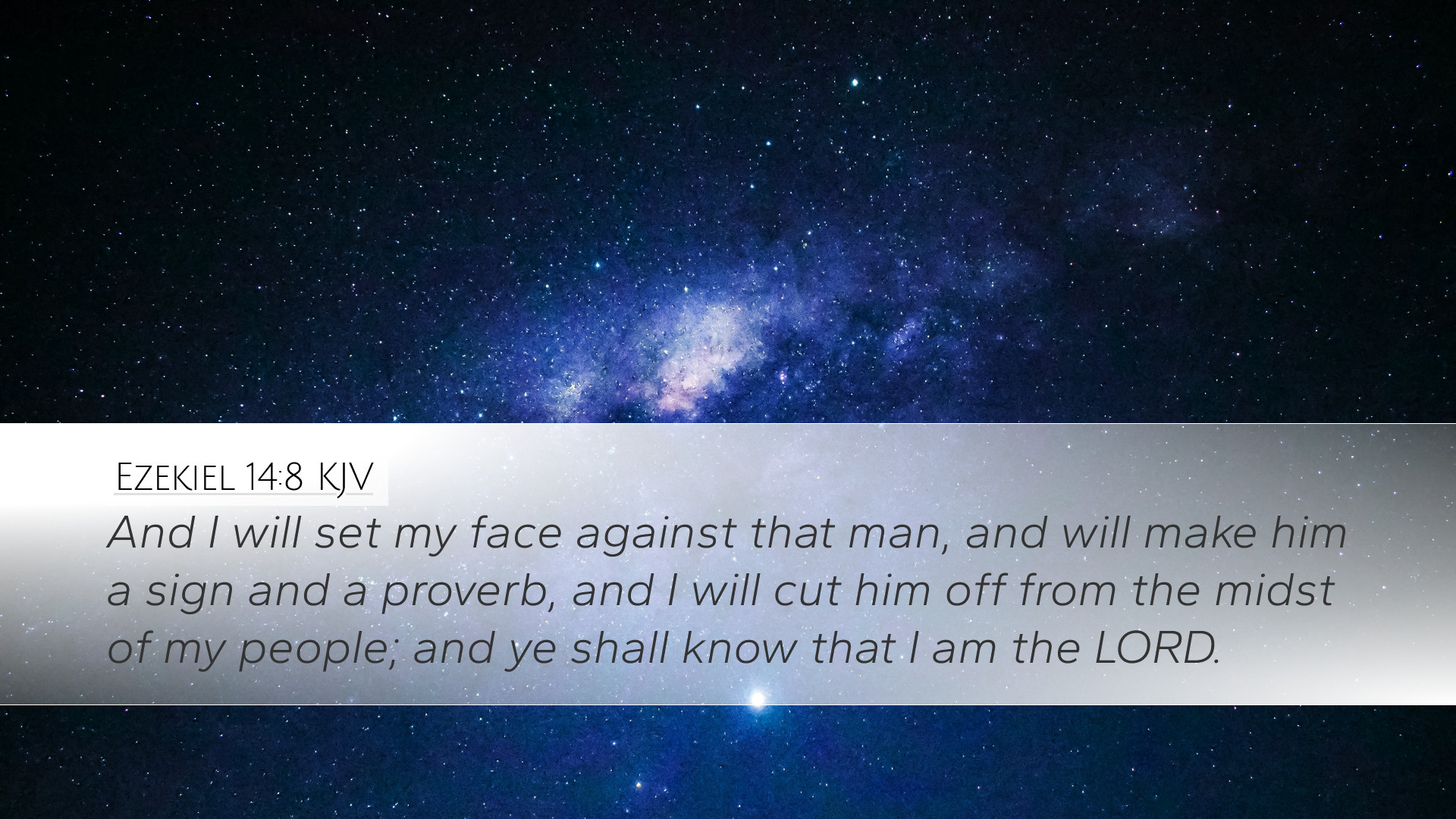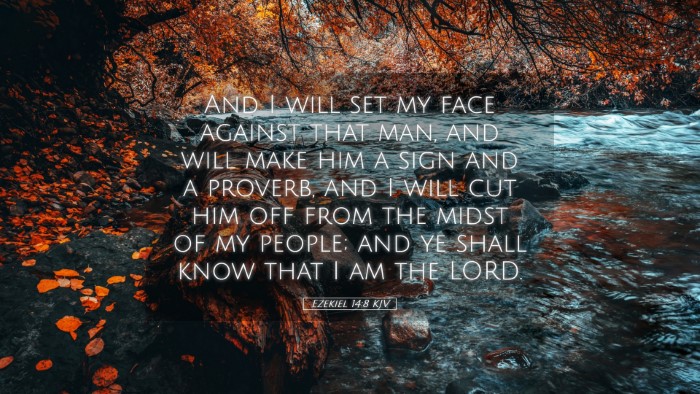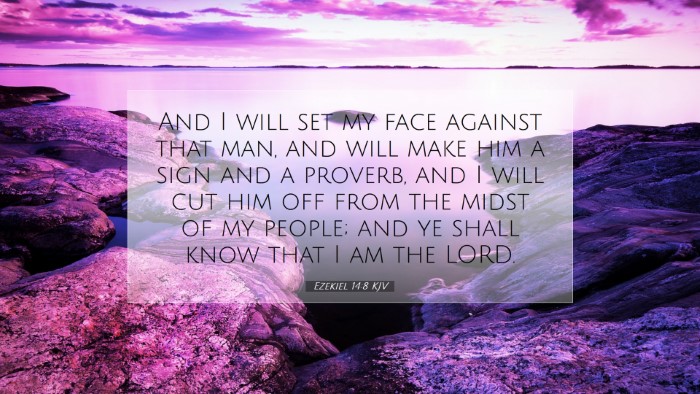Ezekiel 14:8 Commentary
Bible Verse: Ezekiel 14:8 - "I will set my face against that man, and will make him a sign and a proverb, and I will cut him off from the midst of my people; and ye shall know that I am the LORD."
Introduction
The verse under consideration encapsulates a profound declaration concerning judgment and its implications. It serves as a stark reminder of God's sovereignty and the seriousness with which He regards sin. In this commentary, we shall explore several aspects of this verse based on insights from respected public domain commentaries including those of Matthew Henry, Albert Barnes, and Adam Clarke.
Contextual Understanding
A proper understanding of Ezekiel 14:8 requires a look at the surrounding context. The chapter addresses the conditions under which God will respond to the inquiry of the people, particularly regarding idol worship and the defilement of His sanctuary. It highlights God’s determination to impose judgment on those who persist in sin.
God's Response to Idolatry
Matthew Henry emphasizes that the individuals who approach the prophet are guilty of inquiring while simultaneously engaging in idolatry. In essence, they seek guidance from God even while they are committing spiritual adultery by serving other gods. Thus, God's declaration in this verse can be understood as a vehement response to this hypocrisy.
Theological Implications
Albert Barnes comments on the theological weight of “setting His face against” an individual. This phrase emphasizes God's active opposition towards sinners who refuse repentance. It signifies that God is not a passive observer but rather an active agent in the affair of human morality, signifying His holiness and justice.
Israel's Accountability
The collective nature of Israel's sin is also noteworthy here. Adam Clarke points out that the message of God through Ezekiel was not merely for individual offenders but also served as a prophetic warning to the entire community. Their corporate identity allowed sin to proliferate, necessitating collective judgment.
Analysis of Key Phrases
To unpack this passage more fully, we must analyze some significant phrases and their implications in broader biblical context.
"I will set my face against that man"
This phrase conveys vehement displeasure. Matthew Henry notes that this metaphorical language illustrates a direct confrontation. When God 'sets His face' against someone, it indicates a removal of favor and protection. It is a declaration that the individual is now an object of divine wrath.
"Make him a sign and a proverb"
Barnes explains that the individual who faces divine judgment becomes a cautionary tale. The actions of this person will serve as a sign and a proverb, meaning that his fate will be a continuing warning for others not to follow a similar path. God's judgment will be a testimony, speaking to the ongoing need for fidelity and obedience.
"Cut him off from the midst of my people"
This act of divine judgment involves exclusion. Clarke states that being 'cut off' implies a severe consequence for unrepentant sin, indicating both physical and spiritual separation from the community of God. In terms of Israel's covenant relationship with God, such exclusion denotes a severance from blessing and protection.
Historical and Cultural Context
Understanding the historical background of Ezekiel is crucial. The prophet was ministering during a tumultuous time for Israel, as they faced the Babylonian exile. The people were influenced profoundly by surrounding pagan cultures, leading to syncretism in their worship practices. This context accentuates the gravity of God's response in verse 8.
The Nature of God's Judgment
God's judgment in the Old Testament often serves as a precursor to restoration. As highlighted by Henry, the divine intent is not merely punitive but also corrective. The intent is that through witnessing justice executed, the people might turn back to God, seeking His mercy rather than experiencing His wrath.
Practical Applications
For contemporary readers, Ezekiel 14:8 speaks powerfully about the nature of sin and the seriousness with which God regards idolatry in all its forms. Not only does this apply to overt forms of idol worship, but also to modern distractions that take priority over our relationship with God.
Call to Repentance
This passage serves as an exhortation to self-examination. Barnes suggests that facing God's scrutiny should lead individuals and communities to a place of repentance and humility. Individuals are urged to recognize areas within their lives where they may be in conflict with God’s commandments.
Community Accountability
The communal implications of sin are also critical. Just as God's judgement was directed at a community that allowed sin to fester, modern readers must grapple with their own communal responsibilities. Clarke emphasizes the need for the church to uphold holiness collectively, serving as a light to the world.
Conclusion
Ezekiel 14:8 holds a multifaceted significance that resonates both with ancient Israel and with today's believers. It showcases God's unwavering commitment to justice while simultaneously pointing towards the importance of repentance and spiritual integrity within the community. The insights from public domain commentaries enrich our understanding and application of this powerful verse.
In this light, it becomes imperative for pastors, theologians, and students of the Word to approach God with sincerity and transparency, seeking His truth while recognizing the weight of our collective and individual actions before Him.


